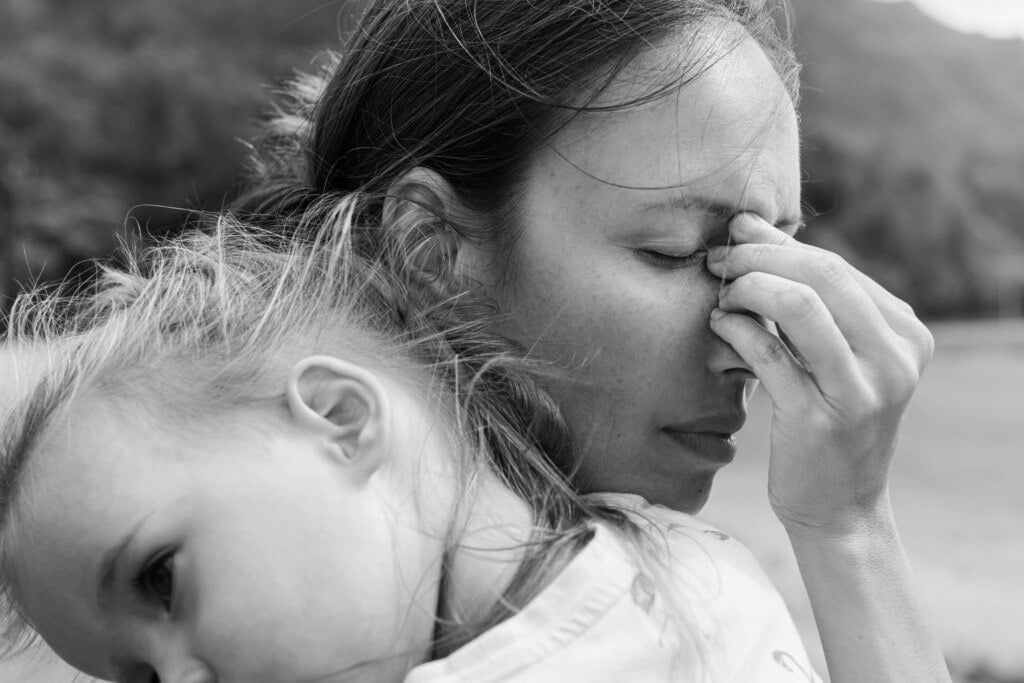If you have an uninvolved family in your child’s life, it can hurt . . . a lot. Family dynamics can be complicated at the best of times. But when we have our own children, things can get even more complex.
When you find out you are pregnant, you might start imagining heart-warming, intergenerational scenes. Things like happy family dinners, your dad teaching your little one to ride a bike, and sleepovers with their cousins. Even if you don’t expect it, you might start thinking about the role of your family as a support network for you and your child as you navigate parenthood.
However, this rose-tinted view of family and connectedness isn’t always the experience parents have. Maybe you have a parent or sibling who refuses to try to connect with your child. Perhaps they don’t visit or make excuses to miss critical milestones like first birthdays or sports games. Or maybe you intentionally leave them uninvolved because they are toxic. Regardless of the reason, having an uninvolved family is confusing and painful.
Coping With Having an Uninvolved Family
As a psychologist, I have had many clients and families express distress around this topic. They share concerns like, “It hurts my feelings that they are rejecting my child,” “I needed their help, and they weren’t around when things got tough,” and “My child is starting to see other families and is wondering why they don’t get to see their grandparents.” Beyond the actual hurt they experience, parents also worry about the influence an absent family could have on their child. How can you deal with having an absent family?
Reflection!
There may or may not be reasons your family isn’t involved. It can help to think about things that may contribute to their lack of involvement.
For instance, our parents’ generation has to work longer before retiring. And that’s if they can retire. And the role of grandparenting has changed as many families are now less able to step in and support as they work later in their own life. This can take a toll on their energy and how they choose to spend their downtime. It could also negatively impact their health and availability to step in and support you (if they are having struggles of their own).
Another reflection could be their understanding and expectation of what a grandparent, aunt, uncle, etc., do. You might not be on the same page, and coming to some middle ground might take a while.
Talk it out.
Sit down and have a conversation with the family member. Yes, it might be awkward and uncomfortable, but it’s essential to explore and set expectations, so you know what the other needs. This doesn’t guarantee they will come to the party, but if you find out what level of involvement they are looking for and share what you are hoping for, you can try and find a happy medium.
You can also find areas of common interest to try and get them to connect with your child. For example, does your child love baking like your mom? Well, see if you can set up a catch-up that has a focus. You could also share an experience you had as a child that you would like them to replicate, like when your dad taught you how to fish. Ask if they can repeat this for your child and share how this memory influenced you.
You’ve tried everything . . . now what?
Despite your best efforts and willingness to be open and negotiate, they still might not want to get involved. So, what’s next?
Let yourself grieve.
First, it’s natural to grieve the loss of your expectation. People often think that grief happens when someone passes away, but we can also experience grief around the loss of relationships (breakups, separation, emotional distance, etc.) and grief around lost hopes and expectations. So, allow yourself to feel all the feelings. It’s normal for all kinds of emotions to come up if your family is uninvolved.
Remain respectful.
Don’t bad mouth them in front of your child. It might be tempting if you are hurt or their choices have been problematic or hurtful. But avoid it because your child may one day develop a relationship with your family, and you want to give them that opportunity.
Also, even if the family never gets involved, the idea of “family” helps give kids a sense of security as they understand their place in the world. Even if the relationship is not positive, kids need to know where they have come from, and we don’t want to make a tenuous relationship even more so by being critical.
Find your “family.”
Shift your focus onto “found family”— people in your life who you choose to surround yourself with, not those necessarily related to you by blood. This could be friends, other extended family members (like your aunt/uncle/cousins, etc.), neighbors, religious community members, school parents, or even online friends and parenting support groups.
Although I have shared some ideas to help manage the situation, it won’t take away from your hurt feelings. Shift your focus to things you can control, like moving forward, finding your support network, and, most importantly, how you will choose to parent and raise your child. The role you will play in their life is the priority. Enjoy every moment that you can with your child. It’s unfortunate if your family doesn’t choose to be in your child’s life. But it’s their loss that they will miss the chance to see all the wonderful, amazing things your child will get up to as they grow.

























